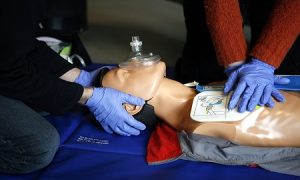HLTAID009 Provide CPR – Cardiopulmonary Resuscitation

Cardiopulmonary Resuscitation (CPR)
is a life-saving skill that can be easy if you have learned to Respond Right First Aid. The course provides you training, skills, and knowledge to make Provide Cardiopulmonary Resuscitation (CPR) a breeze and is compliant with the Australian Resuscitation Council (ARC) Guidelines. Anyone can learn CPR – and everyone should! Sadly, 70% of Americans may feel helpless to act during a cardiac emergency because they either do not know how to administer CPR or their training has significantly lapsed. This alarming statistic could hit close to home because home is exactly where 88% of cardiac arrests occur. Put very simply: The life you save with Provide Cardiopulmonary resuscitation CPR is most likely to be someone you love.
Cardiac arrests are more common than you think, and they can happen to anyone at any time.
– Nearly 383,000 out-of-hospital sudden cardiac arrests occur annually, and 88 percent of cardiac arrests occur at home.
– Many victims appear healthy with no known heart disease or other risk factors.
– Sudden cardiac arrest is not the same as a heart attack.
– Sudden cardiac arrest occurs when electrical impulses in the heart become rapid or chaotic, which causes the heart to suddenly stop beating.
– A heart attack occurs when the blood supply to part of the heart muscle is blocked. A heart attack may cause cardiac arrest.
-The life you save with CPR first aid is most likely to be a loved one.
– Four out of five cardiac arrests happen at home.
– Statistically speaking, if called on to administer CPR first aid in an emergency, the life you save is likely to be someone at home: a child, a spouse, a parent, or a friend.
– Failure to act in a cardiac emergency can lead to unnecessary deaths.
– Effective bystander CPR provided immediately after sudden cardiac arrest can double or triple a victim’s chance of survival, but only 32 percent of cardiac arrest victims get CPR from a bystander.
– Sadly, less than eight percent of people who suffer cardiac arrest outside the hospital survive.
Prior to attending the course, participants are sent a link to complete mandatory online learning and assessment by reading the Participant Guide and successfully answering 15 knowledge questions at their own pace.
There must be demonstrated evidence that the candidate has completed the following tasks at least once in line with state/ territory regulations, first aid codes of practice, ARC guidelines, and workplace procedures
– Conducted a hazard assessment and identified strategies to minimise risk
– Demonstrated safe manual handling techniques first aid
– Assessed airway, breathing, and responsiveness of casualty.
Perform at least two (2) minutes of uninterrupted CPR on both an adult and an infant resuscitation manikin placed on the floor demonstrating the following techniques on each
– Checking for response and normal breathing
– Recognising abnormal breathing
– Opening and clearing the airway
– Using correct hand location, compression depth rate in line with the ARC recommended ratio of compressions and ventilations
– Acting in the event of regurgitation or vomiting
– Following the single-rescuer procedure, including the demonstration of a rotation of operators with minimal interruptions to compressions
– Followed the prompts of an AED
– Provided an accurate verbal report of the incident
– Responded to at least one simulated resuscitation scenario contextualised to the candidate’s workplace/community setting.
Important information prior to enrolment
This course will be delivered in the clients workplace or at Respond Right Australia training facility.
Participants must have the physical capacity to perform 2 minutes of uninterrupted CPR on the floor.
– Face to Face – 3 hours (minimum) full face to face course
– Blended delivery – 2 hours (minimum) face to face course with the addition of 1 hour self-paced learning to be completed prior to attending the face to face course
-Refresher training – 2 hours (minimum) face to face course – conditions apply for this option, for example, you will need to provide previous current certificates.
– Online Training with Face to Face Assessment – 15 minutes (minimum) face to face assessment with the addition of 3 hours of self-paced learning to be completed prior to attending the face to face course.
Individuals undertaking this course will be expected to complete both written and practical assessment tasks. These are detailed in the sections following.
It is recommended that renewal for this course is undertaken annually (every year).
– Please refer to our booking calendar for individual course fees.
– Refund and fee protection policy – Please refer to the student handbook.
– Payment Terms – Payment for individual participants is upfront, group booking payment terms are based on an agreement between the client and service provider.
No work placement will be required as part of this course.
Please note that enrolment to this course is made with . Please refer to the student handbook located on the RTO website xxxx for all details relating to rights and responsibilities including complaints and appeals.
Delivery of course information and learning activities.
Assessments conducted during face-to-face training session(s) include:
- Performance tasks – The assessor must observe the following performance tasks:
- Perform CPR on an infant.
- Practical scenarios – The assessor must observe the following practical scenario:
- Perform CPR on an adult.
- Theory assessment – A written assessment consisting of multiple-choice questions. The student must successfully complete all assessment questions.
Student Information
Below is a link to our Student Handbook which contains information about student rights and responsibilities, and provides access to all relevant information as they embark on their learning experience. The student handbook will help you to make informed decisions and advise how to seek assistance when needed.
We understand that there are times when you may need to reschedule or cancel a course booking. If this is the case please get in touch with us via email, admin@firstaidtrainingwa.com
To reschedule your CPR course please provide your original booking information and the day you would like to change to.
For any cancellations made more than 48 hours prior to the course an administrative fee of $20.00 will apply. Unfortunately no refunds or changes to course bookings can be made within 48 hours of a course start time.
From 1st January 2015, it is a government requirement to have a Unique Student Identifier Number (USI) for all nationally recognised courses that you attend.
It is free and easy for you to create your own USI online.
Click below for assistance and information on how to obtain your USI.
Respond Right Australia Courses:
- Basic First Aid
- Provide CPR
- O2 Provider – O2 Administration
- AED
- Apply First Aid
- Apply Advanced First Aid
- One on One Training
We provide all the learning equipment including first aid mannequins, bandages, AED and O2 unit. To save you time we offer an home study learning component so you can complete before you commence training with us.
As a mobile training provider we are able to run courses where you want them, when you want them. Or join us at our location for your training needs. Our courses are delivered in a friendly, fun, relaxed manner, using the highest quality training equipment and course resources.

